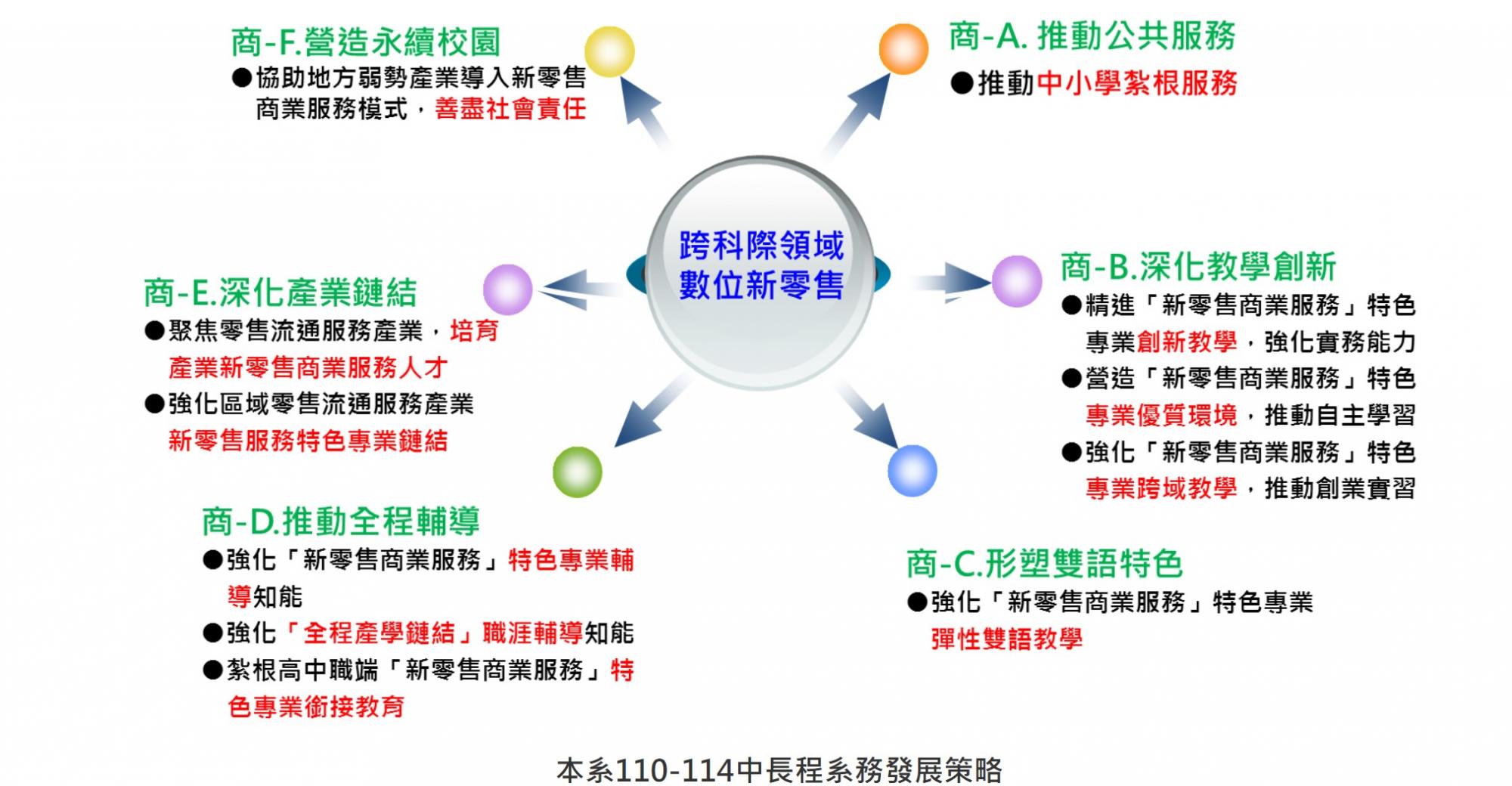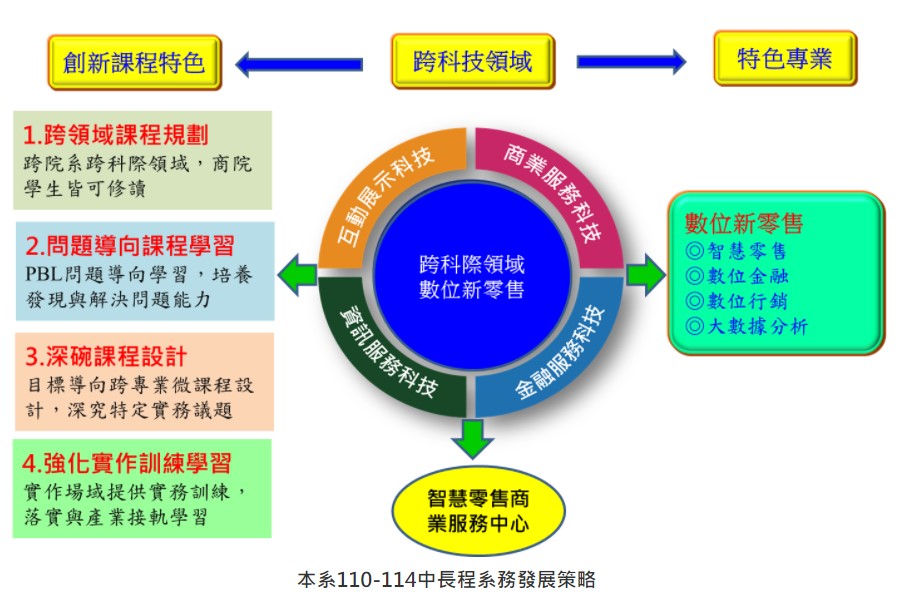Introduction
Development Goals
The following chart shows the department’s educational goals and core competencies, which were established based on a comprehensive industry environment analysis (including suggestions from the Advisory Committee members and the employer satisfaction survey) and internal environment analysis (including the core competencies of the school and College of Business Administration as well as the current development status of the department), and were approved by the Departmental Assembly on November 4, 2020.
Educational Goals and Core Competencies of the Department
|
Educational Goals |
||
|
Training students to be basic- and middle-level talents in practical new retail service which required in the retail and distribution industry |
||
|
Cultivation of core competencies/List of core competencies |
||
|
Personal Morality |
A. Personal morality skills required in the workplace |
A1.Team spirit |
|
Basic Skills |
B. Basic language and information skills |
B1. Information application skills |
|
Professional Skills |
C. Professional and practical skills in new retail marketing and supply chain management |
C1. Professional knowledge and skills in management |
Development Policy (Medium- and Long-term Plan for the Academic Years of 2022-2025)
Following the principle of rolling departmental affairs promotions, the medium- and long-term development plan for the academic years of 2018-2022, the medium- and long-term development strategy for the academic years of 2021-2025, the promotion strategy and development plans for specialties such as “interdisciplinary productivity” and “digital new retail” of the College of Business and Management, and the department’s implementation of educational goals and feature development in 2018-2020, the department maps out the following promotion strategies and specific action plans for medium- and long-term promotion of departmental affairs in 2021-2025.

跨科際領域Interdisciplinarity
數位新零售Digital new retail
A-推動公共服務Promoting public service
推動中小學紮根服務Promoting service that facilitates foundation building in elementary and middle schools
B-深化教學創新Strengthening innovative teaching
精進「新零售商業服務」特色Advancing the features of “new retail business service”
專業創新教學,強化實務能力Professional innovative teaching and enhancement of practical skills
營造「新零售商業服務」特色Establishing the features of “new retail business service”
專業優質環境,推動自主學習Professional and excellent environment and promotion of self-learning
強化「新零售商業服務」特色Strengthening the features of “new retail business service”
專業跨域教學,推動創業實習Professional interdisciplinary teaching and promotion of entrepreneurship internships
C-形塑雙語特色Developing bilingual features
強化「新零售商業服務」特色專業Strengthening the specialty in “new retail business service”
彈性雙語教學Flexible bilingual education
D-推動全程輔導Promoting full-course coaching
強化「新零售商業服務」特色專業輔導知能Strengthening coaching knowledge and skills in the specialty in “new retail business service”
強化「全程產學鏈結」職涯輔導知能Strengthening coaching knowledge and skills in “full-course industry-academia collaboration”
紮根高中職端「新零售商業服務」特色專業銜接教育Foundation building of transitional education of “new retail business service” in vocational high school
E-深化產業鏈結Strengthening industrial collaboration
聚焦零售流通服務產業,培育Focusing on the retail and distribution industry
產業新零售商業服務人才Training talents for new retail business service
強化區域零售流通服務產業Strengthening the regional retail and distribution industries
新零售服務特色專業鏈結Integration of specialty in new retail service
F-營造永續校園Building a sustainable campus
協助地方弱勢產業導入新零售Facilitating the integration of new retail into disadvantaged local businesses
商業服務模式善盡社會責任Creating a business service model to achieve the fulfillment of social responsibility
The department’s medium- and long-term strategies for development of departmental affairs in 2021-2025

創新課程特色Features of innovative courses
01 跨領域課程規劃Interdisciplinary course planning:
跨院系跨科際領域,商院學生皆可修讀Intercollege, interdepartmental, and interdisciplinary courses available for students of the College of Business and Management
02 問題導向課程學習Courses for problem-based learning:
PBL問題導向學習,培養發現與解決問題能力Cultivation of problem-finding and problem-solving skills through problem-based learning (PBL)
03 深碗課程設計Design of multiple-credits courses:
目標導向跨專業微課程設計,深究特定實務議題Design of goal-oriented and interdisciplinary micro-courses on specific practical issues
04 強化實作訓練學習Strengthening practice training:
實作場域提供實務訓練,落實與產業接軌學習Practical industry-academia collaboration in practice training in actual workplace environments
跨科技領域 Interdisciplinarity
跨科際領域Interdisciplinarity & 數位新零售Digital new retail
• 互動展示科技Interactive exhibition technology
• 商業服務科技Business service technology
• 資訊服務科技 Information service technology
• 金融服務科技Financial service technology
特色專業Specialty
數位新零售Digital new retail
• 智慧零售Smart Retail
• 數位金融Digital Finance
• 數位行銷Digital Marketing
• 大數據分析 Big Data Analysis
智慧零售商業服務中心Smart retail business service center
The department’s medium- and long-term strategies for development of departmental affairs in 2021-2025
Future Prospects
Our department has been continuously making improvements in numerous aspects regarding instructional effectiveness, such as departmental affairs, faculty, courses, instruction, coaching, and industry-academia collaboration, by following the PDCA structure. In consideration of the growingly arduous operating environment of higher education and the possible impact and challenges in the future, our department will persevere in comprehensive quality management, make long-term improvements in our mechanism, and strengthen the comprehensive promotion of school affairs. We will also continue promoting interior and exterior inspection by means of the complete self-evaluation support system in order to ensure sustainable development of departmental affairs. Moreover, with our forward-looking and innovative insight, our department aspires to make breakthroughs and continue to work on enhancing our instructional quality and R&D level. Besides establishing significant specialties, we will endeavor to fulfill the aforementioned quality assurance methods through examining the feedback from the objective interior and external evaluation and making improvements in the processes. In this way, we aspire to become a sustainable department of a university of technology that fulfills the social responsibility of a university of technology.

